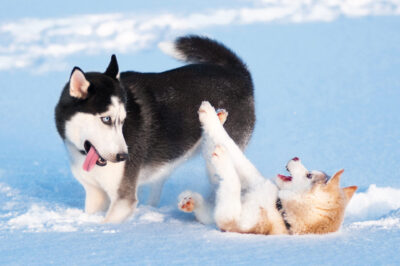The Siberian Husky is a breed of dog known for its playful and friendly temperament. With a strong work ethic and a love for the outdoors, these dogs are often described as having a mischievous streak and a willingness to please. Despite this, their loyalty, intelligence, and affectionate disposition make them a popular breed among dog lovers. This page will give detailed information about Siberian Husky temperament; enjoy.
The Siberian Husky is known for its friendly, outgoing, and energetic temperament. They are social dogs that love to be around people and other animals. They are also independent and intelligent, which can sometimes lead to them being stubborn or mischievous.
The Siberian Husky is a highly active and playful breed that requires plenty of exercises and mental stimulation to keep them happy and healthy. They have a strong prey drive and can be prone to chasing small animals, so keeping them well-supervised when outside is essential. They are also known for their vocal nature and tend to howl rather than bark.
Additionally, their friendly disposition means they can sometimes be too familiar with strangers, so early socialization and training are essential for their development. Despite their energetic nature, they are also known for being good with children and making excellent family pets.
Siberian Husky temperament
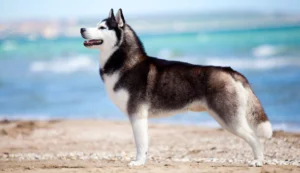
Siberian Huskies are friendly, outgoing, and affectionate dogs. They are highly social and love to be around people and other dogs. They are intelligent, energetic, and playful and are known for their mischievous streak. Despite their friendly nature, they can be independent and stubborn at times, so consistent training and socialization from an early age are essential.
Siberian Huskies were bred for sledding and pack work and had a strong instinct to run and explore. They require plenty of physical and mental stimulation to prevent boredom and destructive behavior. They need to be better-suited for apartment living and need a secure, large yard to run and play in.
Siberian Huskies are also known for their strong pack instincts and loyalty to their family. They are generally good with children, but due to their high energy and playful nature, they may accidentally knock over smaller children. They are also known for their escape artist tendencies, so providing them with a secure, fenced yard or always keeping them on a leash when outside is crucial.
Another critical aspect of the Siberian Husky temperament is their tendency to bark and howl. They are not typically considered good guard dogs, but they will bark to alert their owners of any unusual activity. Their howling can also be a source of frustration for some owners, especially those living near their neighbors.
Siberian Huskies were bred to work in packs and do their best when they were part of a family pack. They enjoy the company of other dogs and are generally good with other pets, but they may have a high prey drive and may chase smaller animals.
Are Siberian Huskies good with children?
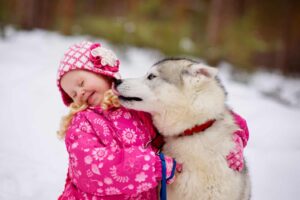
Siberian Huskies are generally good with children. They are friendly, outgoing, and affectionate and tend to be patient and playful with kids. However, due to their high energy and strong instincts, they may accidentally knock over smaller children, so it’s important to supervise interactions between the dog and children, especially when the dog is in a playful mood.
Additionally, children should be taught how to interact safely with dogs and treat them respectfully.
It’s also important to note that some individual Siberian Huskies may have a higher tolerance for rough play or may be more sensitive to certain types of handling. Hence, it’s important to monitor interactions between the dog and children and adjust play styles accordingly.
Another factor to consider is that Siberian Huskies are a large breed with a lot of energy and may need to realize their strength when playing with children. Children should be taught never to approach a dog while it’s eating, sleeping, or caring for puppies and to always ask for the owner’s permission before petting or playing with a dog.
Socialization and training can also play a role in how well a Siberian Husky gets along with children. Dogs that are well-socialized from an early age and receive positive reinforcement training are more likely to be good with children.
Do Siberian Huskies make good apartment dogs?
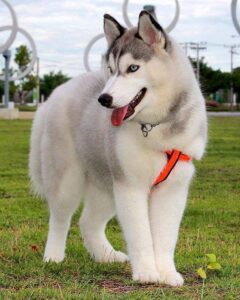
Siberian Huskies need to be better-suited for apartment living. They are an active, high-energy breed originally bred for sledding and pack work, requiring plenty of physical and mental stimulation. They have a strong instinct to run and explore and need a secure, large yard to run and play in.
Confining a Siberian Husky in a small apartment or living space can lead to behavioral issues and destructive behavior.
Siberian Huskies are also known for their vocalization and love of howling, which can be a source of frustration for apartment dwellers and their neighbors. They also have a strong prey drive and may chase smaller animals, which can be dangerous in an apartment complex.
Are Siberian Huskies easy to train?
Due to their independent and stubborn nature, Siberian Huskies can be challenging to train. They were originally bred to work in packs and make their own decisions, and this trait can make them resistant to following commands.
However, with patience, consistency, and positive reinforcement techniques, Siberian Huskies can be trained to perform basic obedience commands and tricks.
It’s important to start training and socialization from an early age, as Siberian Huskies can become more challenging to train as they get older if they are not correctly socialized and trained. Training should be positive and reward-based, and it’s essential to remain patient and consistent, as progress may be slow.
Siberian Huskies are intelligent dogs, and they enjoy mental stimulation as well as physical exercise. Training sessions can be a great opportunity to challenge them mentally, and incorporating play and games into training can help keep them engaged and motivated.
Are Siberian Huskies aggressive?
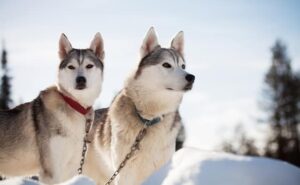
Siberian Huskies are not typically aggressive dogs but are known for their friendly, social, and outgoing nature. However, like all dogs, they can display aggressive behavior under certain circumstances, such as feeling threatened, uncomfortable, or trying to protect their family or territory.
Remember that various factors, including genetics, socialization, training, and environment, can cause dog aggression. Proper socialization and exercise can help prevent aggressive behavior in Siberian Huskies.
Suppose a Siberian Husky is displaying aggressive behavior. In that case, it’s essential to consult a professional dog trainer or veterinarian to determine the cause and develop a training plan to address the behavior.
Do Siberian Huskies shed a lot?
Siberian Huskies are heavy shedders. They have a thick, double coat of fur that helps them regulate their body temperature in extreme temperatures, and they shed heavily twice a year to get rid of the old inner layer of fur to make room for a new one.
Nevertheless, during these heavy shedding periods, it’s not uncommon for large clumps of fur to come out, and regular grooming is necessary to remove loose hair and keep the coat healthy.
Siberian Huskies also shed moderately throughout the year, so they are not a good choice for people with allergies or who are sensitive to dog hair. Regular brushing can help minimize shedding and keep the coat healthy, but it will not eliminate shedding completely.
However, Siberian Huskies are heavy shedders and shed heavily twice a year and moderately throughout the year. They are not a good choice for people with allergies or who are sensitive to dog hair, and regular grooming is necessary to remove loose hair and keep the coat healthy.
Are Siberian Huskies good with other dogs?
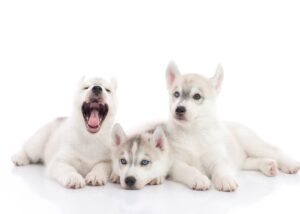
Siberian Huskies can get along well with other dogs, but it depends on the individual dog’s personality, socialization, and experience with other dogs. Some Siberian Huskies are naturally sociable and friendly towards other dogs, while others may be more independent or aloof.
Proper socialization from an early age can help ensure that a Siberian Husky is comfortable and confident around other dogs, and positive reinforcement training can also help reinforce good behavior around other dogs.
It’s important to supervise interactions between a Siberian Husky and other dogs, especially when introducing them, as some dogs may possess toys, food, or attention and display aggressive behavior.
How active are Siberian Huskies?
Siberian Huskies are a highly active breed that requires plenty of physical and mental stimulation. They were initially bred for sledding and pack work, and they have a strong instinct to run and explore. They need a significant amount of daily exercise, including long walks, runs, and play sessions.
Siberian Huskies enjoy mental stimulation and can benefit from training and interactive games. They are energetic and need an active family or owner who can provide them with the exercise and stimulation they need.
Providing a Siberian Husky with plenty of physical and mental stimulation opportunities is essential, as a lack of exercise and stimulation can lead to destructive behavior and boredom. Siberian Huskies also have a high prey drive and should be kept securely fenced, as they may chase smaller animals if they are allowed to roam free.
Do Siberian Huskies have separation anxiety?
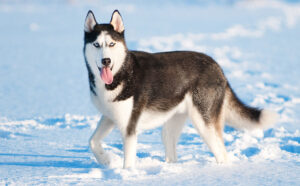
Siberian Huskies can develop separation anxiety like any other breed of dog. Separation anxiety is a behavioral disorder that occurs when a dog becomes overly attached to their owner and experiences distress when separated from them. This can lead to destructive behavior, barking, whining, and other symptoms of distress.
The causes of separation anxiety in dogs can be complex, and it can be triggered by changes in routine, moving to a new home, or the loss of a family member. Siberian Huskies, as a breed, are known for their strong social bonds with their owners and can be prone to separation anxiety if they are not correctly socialized and trained.
If a Siberian Husky is exhibiting symptoms of separation anxiety, it’s essential to consult a professional dog trainer or veterinarian to develop a training plan to address the behavior. This may involve gradually acclimating the dog to being alone, providing them with toys and bones to occupy them, and using positive reinforcement training to build their confidence and independence.
Are Siberian Huskies good for first-time owners?
Siberian Huskies can be challenging for first-time dog owners. They are a high-energy breed that requires plenty of physical and mental stimulation, and they can be challenging to train and manage if you are not experienced with dogs.
Siberian Huskies are also known for their independent and stubborn personalities, which can make them challenging to manage if you are not experienced with positive reinforcement training techniques. They have a strong pack mentality and can become destructive or disobedient if they do not have a clear sense of their place in the pack hierarchy.
Also, Siberian Huskies are prone to specific health issues, such as eye problems and hip dysplasia, requiring regular grooming to keep their coats healthy. They also have a high prey drive and can be difficult to contain if they are allowed to roam free, as they tend to wander and explore.
If you are a first-time dog owner, it’s essential to consider your lifestyle and experience with dogs before choosing a Siberian Husky. It’s also crucial to research the breed and seek the advice of experienced dog owners, trainers, and veterinarians to help you understand the breed’s needs and determine whether a Siberian Husky is the right breed for you.
Are Siberian Huskies good watchdogs?
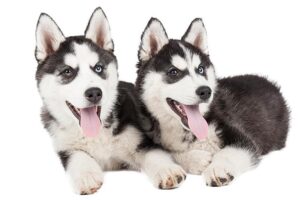
Siberian Huskies are not typically good watchdogs. Although they are alert and have a strong sense of hearing, they are generally friendly and sociable dogs that do not have a strong instinct to protect their home and family.
Siberian Huskies were initially bred for sledding and pack work, and they have a strong pack mentality that makes them social and friendly with people and other dogs. They are not known for being aggressive or protective and are unlikely to bark or challenge intruders.
If you are looking for a watchdog, choosing a breed with a strong instinct to protect its home and family is essential. Breeds such as German Shepherds, Rottweilers, and Doberman Pinschers are commonly used as watchdogs, as they have a natural instinct to guard and protect their home and family.
Do Siberian Huskies have a strong prey drive?
Siberian Huskies have a strong prey drive. As a sledding breed, they have a high energy level and an instinct to hunt and chase small animals. This can make them prone to chasing squirrels, birds, rabbits, and other small animals if they can roam freely.
A strong prey drive can also make it challenging to train a Siberian Husky to ignore or recall distractions, as they may become easily distracted by the sights and sounds of small animals. This can concern owners who live in areas with wildlife or have small pets, such as cats or small dogs.
It’s important to properly socialize and train a Siberian Husky to help control their prey drive and to keep them safe. This may involve using positive reinforcement training techniques to redirect their attention and providing them with plenty of physical and mental stimulation to help burn off their excess energy.
Do Siberian Huskies require a lot of grooming?
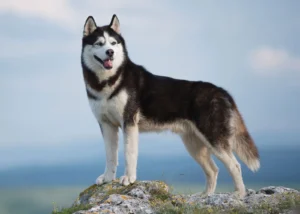
Siberian Huskies require a lot of grooming. They have a thick, dense coat that helps keep them warm in cold weather, but it also sheds heavily twice a year, resulting in a lot of hair around the house. They also have a thick undercoat that requires regular grooming to prevent matting and tangles.
Regular grooming is vital to keep a Siberian Husky‘s coat healthy. It may include brushing their coat regularly to remove loose hair, bathing them as needed, and trimming their hair to prevent matting and tangles. Grooming helps reduce the amount of shedding, and it can also help to improve their overall health and appearance.
It’s important to groom a Siberian Husky regularly, especially during the heavy shedding seasons, to keep its coat healthy and to prevent matting and tangles. This may require a significant time commitment, a good quality brush and comb, and regular trips to the groomer for a professional trim.
Are Siberian Huskies good with cats?
The compatibility between Siberian Huskies and cats depends on the individual dog and cat and their personalities, and the socialization and training they have received.
Siberian Huskies have a strong prey drive and they are naturally inclined to chase small animals, such as cats. This can make them dangerous to cats, especially if they have not been properly socialized and trained to respect other animals.
However, some Siberian Huskies can learn to live peacefully with cats with proper socialization and training. This may involve gradually introducing the dog and cat to each other in a controlled environment, supervising their interactions, and using positive reinforcement training techniques to encourage good behavior.
It’s also important to consider the age, size, and personality of both the dog and the cat, as well as the living situation and the amount of space available. Cats confident, independent, and well-socialized may be more able to tolerate living with a Siberian Husky, while timid cats may be more easily intimidated by a large and energetic dog.
Do Siberian Huskies have a tendency to be vocal?
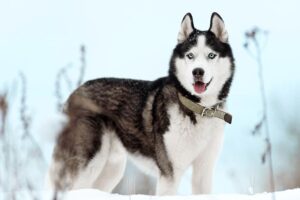
Siberian Huskies tend to be vocal. They are a breed that enjoys making noise and is known for their howling and talking. Some Siberian Huskies may also bark at unfamiliar sounds or people, although this is not as common as their howling.
Siberian Huskies may be more vocal when they are bored, anxious, or in need of attention, and their barking or howling may also be used as a form of communication with their owners or with other dogs. This can be a problem for owners living in apartment buildings or close to their neighbors, as the noise can be disruptive.
It’s essential to train a Siberian Husky to control its barking or howl and to teach the appropriate times to make noise. This may involve using positive reinforcement training techniques to encourage good behavior and redirect their attention when they become vocal.
Conclusion
In conclusion, the Siberian husky temperament is a unique and highly energetic breed that requires an experienced and committed owner. They are affectionate, playful, and intelligent dogs that enjoy human company, but they also have a strong independence streak and a tendency to be vocal.
Siberian Huskies are highly active and need plenty of exercises and mental stimulation to keep them happy and healthy. They have a strong prey drive and are not recommended for homes with small pets like cats. While they can be trained, they are not the easiest breed to prepare and can sometimes be stubborn. They are also not well suited for apartment living and are best suited for homes with large and securely fenced yards.
Siberian Huskies are generally good with children and other dogs, but their strong prey drive can make them a potential danger to small animals. They are also not known for being good watchdogs, as they are more interested in playing and exploring than guarding their territory.

